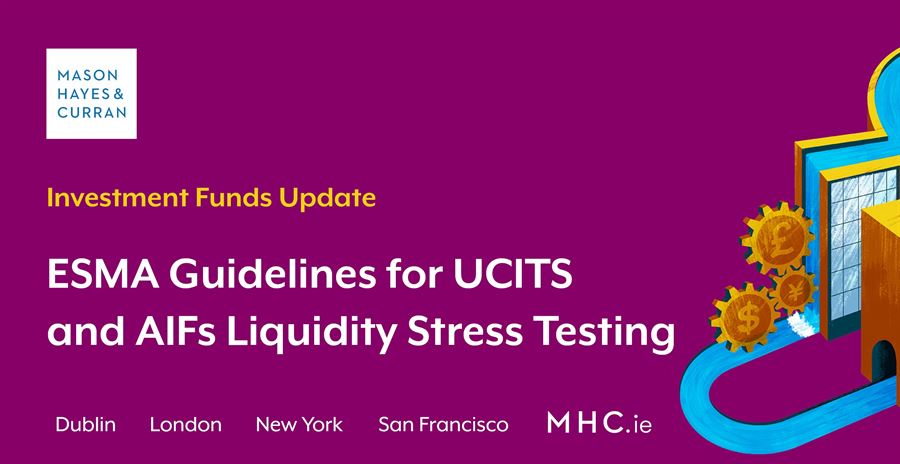ESMA Guidelines for UCITS and AIFs Liquidity Stress Testing – Full Compliance Expected

In a recent notice to industry the Central Bank of Ireland (Central Bank) clarified that it expects management companies to comply in full with ESMAs Guidelines on Liquidity Stress Testing in UCITS and AIFs (LST Guidelines) with effect from 30 September 2020. The Central Bank also explained that it intends to consult with industry on the incorporation of a requirement in the AIF Rulebook and the UCITS regulations to require management companies to adhere to the LST Guidelines. In light of the Central Bank’s communication, management companies are advised to review the LST Guidelines and where relevant update their liquidity stress testing policies in advance of 30 September 2020.
Purpose of the Guidelines
The purpose of the LST Guidelines is to enhance the standards, consistency and frequency to be followed by management companies for the stress testing of liquidity risk for AIFs and UCITS and to promote supervisory convergence by national competent authorities in the EU.
Criteria for conducting stress-tests
The LST Guidelines set out the principle-based criteria for fund management companies to follow when conducting stress-tests on the assets and liabilities of the UCITS/AIF under their management. The LST Guidelines require stress tests to:
- Be specific to the individual UCITS/AIF and not simply be a “one size fits all”
- Regularly test for the risks that are the most applicable and relevant for a particular UCITS/AIF. For example, any liquidity risk caused by investor redemptions
- Test the robustness of the UCITS/AIF in the face of plausible extreme or unfavourable conditions and adequately predict how a management company is likely to react in such conditions, and
- Be a key part of the overall risk management framework in respect of the UCITS/AIF
Verification
The LST Guidelines also require depositaries to establish verification procedures to confirm that management companies have adopted documented procedures for their liquidity stress testing programmes. This verification obligation does not however require depositaries to challenge the liquidity stress testing undertaken by management companies.
.jpg) Expectations clarified
Expectations clarified
The Central Bank also indicated that it intends to consult on the incorporation of a requirement in the Central Bank UCITS Regulations 2019 and AIF Rulebook that management companies and depositaries adhere to the LST Guidelines.
In addition, the Central Bank also updated its UCITS Q&A and AIFMD Q&A to clarify its expectations regarding compliance with the LST Guidelines. The Central Bank confirms the following:
- Liquidity stress testing should be performed at least quarterly and the determination of a higher or lower frequency should be based on the fund’s characteristics and the reasons for such a determination should be recorded in the liquidity stress testing policy.
- Liquidity stress testing should be employed at all stages in a UCITS/AIF lifecycle, including at the design phase.
- For UCITS, it may be appropriate for the liquidity stress testing policy to be documented within the risk management policy of the management company. Notwithstanding this, as outlined in the LST Guidelines, liquidity stress testing should be adapted appropriately to each fund under management.
Conclusion
Management companies should ensure they will be able to comply in full with the LST Guidelines by 30 September 2020. Accordingly, management companies should take this opportunity to review their liquidity management processes and identify any changes to liquidity stress testing procedures that should be implemented and also prepare a documented liquidity stress testing policy to be adopted by the board.
If you would like to discuss the above or require assistance in assessing the application of the LST Guidelines, please contact a member of our Investment Funds team.
The content of this article is provided for information purposes only and does not constitute legal or other advice.
Share this:



